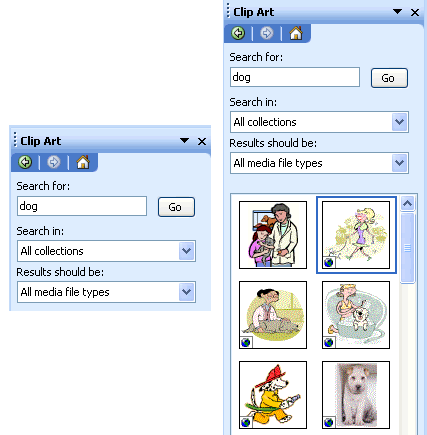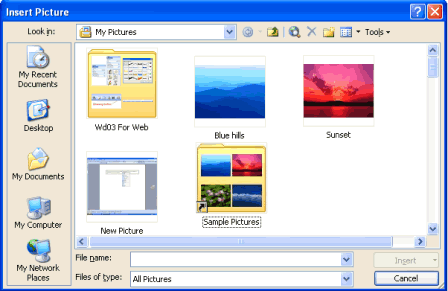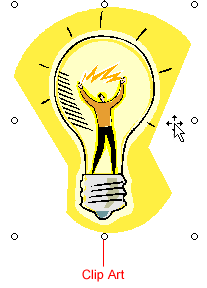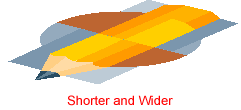Word 2003
Working with Pictures

Introduction
By the end of this lesson, you should be able to:
- Insert pictures
- Edit pictures
Inserting Clip Art
Word comes bundled with hundreds of Clip Art images that are copyright free and available for your personal use. The Clip Art images that are available through Word cover many different categories and can really help enhance your pages. If you have never inserted Clip Art before, Word will ask if you would like to catalog all of the available resources (Clip Art, sound, and video files) on your computer. It is a good idea to go ahead and catalog all of these free resources.
To insert Clip Art:
- Place the insertion point where you want to insert Clip Art.
- Click Insert on the menu bar.
- Select Picture and then Clip Art from the cascading menu. The Insert Clip Art menu opens on the task pane .
- Type a keyword in the Search Text: field.
- Click Search .
AND
-
Specify your search by using the
Other Search Options
.
- Search in: This specifies where Word will search for Clip Art. As long as the check box for Everywhere is checked, Word will search through All Collections.
- Results should be: This specifies what type of file Word will search for (video, audio, photographs, or Clip Art). As long as the check box for All Media Types is checked, Word will search through All Media Files .
- Double-click the Clip Art or picture to add to the document.

 To change your
Search For text:
Click the Modify button below the Clip Art results
To change your
Search For text:
Click the Modify button below the Clip Art results
 .
.
 To preview video and sound clips, click the appropriate tab, then click the Play button to preview the file.
To preview video and sound clips, click the appropriate tab, then click the Play button to preview the file.
To delete a picture:
- Select the image (click on it).
- Press the Delete key on your keyboard.
Inserting pictures from your computer
A picture doesn't have to be in the Clip Gallery in order for you to insert it into your document. The Clip Gallery is just an easy place to store clips you want to use again and again.
To insert a picture that is not in the Clip Gallery:
- Click Insert from the menu bar.
- Select Picture and From File from the cascading menu. The Insert Picture dialog box opens.
- Locate and select the file to insert the selected picture into your document.

Moving clips
Once you have inserted a graphic into your document, you can reposition it until it is in the appropriate location.
By default, when a picture is imported into Word, it is aligned to the left margin. However, just as you would with text, you can change the alignment so the graphic is right-aligned or centered. You can also drag the image anywhere on the page.
To move a clip:
- Select the clip.
- Use your mouse to drag a selected clip to any position on the page.
- The I-beam turns into a white pointer with a little box under it as you move the picture.
OR
- Use the Alignment buttons on the Formatting toolbar.

Sizing handles
You have two options when sizing your graphics. If it is important to maintain proportions, which will prevent the image from looking skewed, you should use the corner handles to resize the image. If you do not need to maintain the graphic's proportions, you can use the top, bottom, or side handles.
Changing size while maintaining proportions:
- Click the image you want to resize.
- Place the cursor over one of the corner handles. The cursor will change into a double-headed arrow.
- Drag the handles until the image is the size you need.

 To keep the center of an object in the same place, hold down the CTRL key while dragging the mouse.
To keep the center of an object in the same place, hold down the CTRL key while dragging the mouse.
Changing size while not maintaining proportions:
If any of the middle handles are dragged (top, bottom, right, or left handles), only the height and width changes, thus changing the proportion, or scale, of the picture.

 Be careful: Using only the sizing handle can make your pictures blurry and distorted.
Be careful: Using only the sizing handle can make your pictures blurry and distorted.
Changing the appearance of your pictures
Sometimes you may need to adjust the sizing of your pictures as well as the brightness. You can adjust your picture using the Picture toolbar.
To use the Picture toolbar:
- Right-click the picture.
- Choose Show Picture toolbar from the shortcut menu.
 Crop, Recolor Object, and Set Transparent Color
buttons are used with areas of the picture. All other buttons affect the entire picture.
Crop, Recolor Object, and Set Transparent Color
buttons are used with areas of the picture. All other buttons affect the entire picture.

Name of button: |
Use it to: |
 Insert Picture from File
Insert Picture from File
|
Insert another picture |
 Color
Color
|
Automatic, Grayscale, Black & White, or Watermark |
 More Contrast
More Contrast
|
Increase color intensity |
 Less Contrast
Less Contrast
|
Decrease color intensity |
 More Brightness
More Brightness
|
Add white to lighten all colors |
 Less Brightness
Less Brightness
|
Add black to darken the color |
 Crop
Crop
|
Cut the sides of an image |
 Rotate Left
Rotate Left
|
Each click turns the image by 90 degrees to the left |
 Line Style
Line Style
|
Customize the border of an image |
 Compress Pictures
Compress Pictures
|
Change the resolution of an image |
 Text Wrap
Text Wrap
|
Set how text wraps around the image |
 Format Picture
Format Picture
|
Displays the Format Picture dialog box |
 Set Transparant Color
Set Transparant Color
|
Use eyedropper to make areas of the picture transparent |
 Reset Picture
Reset Picture
|
Return picture to original format |
Challenge!
- Open your document in Word.
- Insert Clip Art or an image from a file on your computer into your document. You can insert multiple images.
- Resize, modify, and/or move the image to where you want it to be in your document.
- To reposition the image, practice clicking and dragging, centering, right-alignment, and other functions.
Does your flyer or newsletter look the way you want it to? It probably does not look quite like you imagined. You should take the time now to move around the symbols, text boxes, tables, and columns, and add any new components you would like. The more you practice, the easier it becomes.